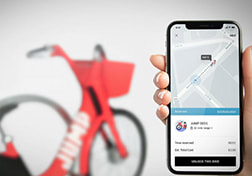SAN FRANCISCO - Resuming its self-driving programme, global ride-sharing major Uber has hired a "micromobility robotics" team to work on autonomous bikes and scooters. The company is working to develop electric scooters and bicycles which can drive themselves around cities in order to reach customers and charging points. Electric scooter and bicycle-sharing services, including Uber's Jump business as well as competitors Bird and Lime, allow customers to collect the vehicles and...

then leave them on the pavement outside their destination, The Telegraph reported late on Sunday.
"The business hasn't published any further information on the project, but said in an online hiring page that it plans to 'improve safety, rider experience, and operational efficiency of our shared electric scooters and bicycles through the application of sensing and robotics technologies'," the report added.
The company is facing stiff competition from Lime, Lyft and numerous other entrants. The move would give it a way to stand out, not to mention ingratiate itself with city officials who would otherwise balk, according to the Engadget.
The company's self-driving car division was temporarily shut down in 2018 after a fatal crash in the US state of Arizona.
A self-driving Volvo SUV from Uber travelling at 64 km per hour had killed a woman, triggering a heated debate on whether autonomous cars are safe enough and who is to blame for the death.
"The business hasn't published any further information on the project, but said in an online hiring page that it plans to 'improve safety, rider experience, and operational efficiency of our shared electric scooters and bicycles through the application of sensing and robotics technologies'," the report added.
The company is facing stiff competition from Lime, Lyft and numerous other entrants. The move would give it a way to stand out, not to mention ingratiate itself with city officials who would otherwise balk, according to the Engadget.
The company's self-driving car division was temporarily shut down in 2018 after a fatal crash in the US state of Arizona.
A self-driving Volvo SUV from Uber travelling at 64 km per hour had killed a woman, triggering a heated debate on whether autonomous cars are safe enough and who is to blame for the death.

 RSS Feed
RSS Feed
